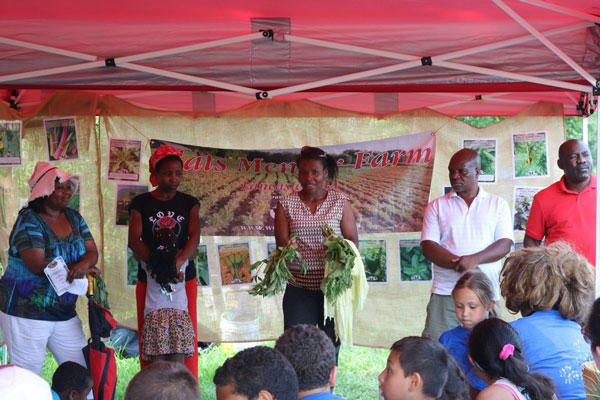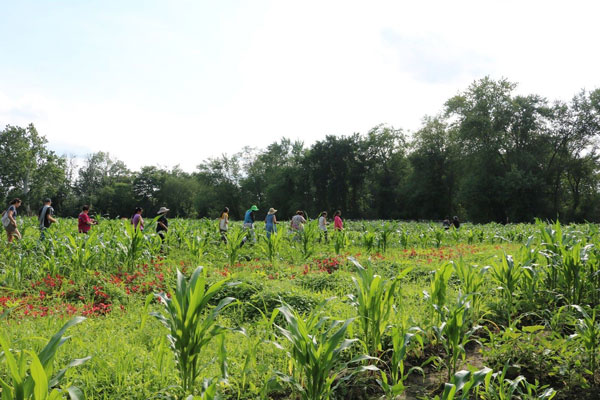Hellen’s Reflection Blog
This blog is from World Farmers' Intern Blog Series, featuring reflections written by 2017, 2018 and 2019 summer high school interns from Nashoba Regional High School. To read the full series, visit our blog page www.worldfarmers.org/blogs, and stay tuned!
What Makes Farming So Attractive?
By Meredith Brummer, Nashoba Regional High School Summer Intern, Summer 2019
Tour de Farm 2019, and The Attraction of Fresh, Local Farms
Growing up in a small town, I have learned to value the currency of fresh, local produce. I live in the town of Lancaster, Massachusetts, which is bursting with agriculture from local farmers. It is not uncommon for friends to bribe me for favors with freshly harvested crops from their local farm stands. Anyone who’s tried to buy local corn knows about high demand market (not to mention how long lines can get). The first few tomatoes are precious, and my mother expands her generosity only as the harvest season picks up. “I helped GROW this,” I boast, as I hand over fresh veggies at a family gathering. I’m sure many of you have your own connection with local food. But what makes local produce so much more special than that from the grocery store, besides bragging rights?
This summer, I have had the opportunity to expand my perspective on local farming with intern work at the World Farmers. Through their program at Flats Mentor Farm, I have been introduced to a unique way in which refugees and immigrants from around the world have been able to connect over their love of farming. These farmers bring this love to the community and share unique crops, recipes, and culture throughout southern New England.
The most amazing aspect of farming I have witnessed this summer is the relationship between farmer, land, and crop. In my eyes, an intention toward upholding this relationship can be seen as a sort of covenant. I’ve been thinking about covenants lately, and how they convey a relationship of mutual love and dedication that can, with a little luck, grow to something greater than the sum of the parts. The farmer cultivates the soil and introduces the crops, and in return the land performs the small miracle of growth. The love poured into the land spells life, not just for the plants, but for the farmer, their family, and the broader community. Dedication to the growing process directly impacts the eventual harvest. Not to mention the alternative: how badly a tomato holds up after two weeks in transport.
I don’t know about you, but tomatoes fresh from the farm will always taste better than anything I can buy in store.
On July 19th, World Farmers celebrated its Fifth Annual Tour de Farm. At this event, curious community members were invited to visit and tour Flats Mentor Farm. Those who attended learned about our program and even heard from some of the farmers who have joined our community of local agriculture. Many of the farmers brought crops from their country or culture of origin, and shared their stories about becoming rooted with assistance from the Flats Mentorship Program. One such example is that of Rael, an immigrant farmer from Kenya. At Tour de Farm she shared how she scoured the American grocery stores for familiar crops native to her country, to no avail. When she was introduced to our programs, she grew excited at the opportunity to grow crops like managu, a leafy, bitter vegetable common throughout Kenya, and chinsaga, the leaves and shoots of which are typically eaten boiled or in stews. Growing these crops have not only provided her with a means to pursue business opportunities, but also to bring a familiar taste to her new home.
Visitors who joined us at the Tour de Farm toured the dream-like atmosphere of Flats Mentor Farm. Guests walked by rows and rows of fresh veggies and herbs that appear more delicious the closer you look. Our farmers, each with their own design and commitment to the land, work day-in and day-out on their harvest. Since each is given full control over what they plant, many of the crops are ones that I was not familiar with before this summer, such as lalu, a leafy vegetable found in Africa and the Caribbean. Some farmers bring different versions of plants I am familiar with, but utilize them in ways that would have never occurred to me. Central Asian farmers harvest pea tendrils, the young leaves, flowers, stems, and vines of pea plants. Others farm in ways that emerge from long lines of cultural tradition. Many of our African farmers plant beans to climb up the stalks of corn, as the corn benefits from the nutrients the beans bring to its soil. This tradition has also been used by indigenous people in the Americas with their “three sisters” approach: planting corn, beans, and squash together. Traditions like these have maintained a living connection between generations of farmers.
This summer has been a great learning opportunity to expand my understanding of what it means to be a farmer, and the never-ending work that goes along with it. The sheer variety of farmers involved in the program have introduced me to a variety of cultures, each with their own traditions, crops, and approaches to farming. There are so many new vegetables and recipes on my plate to try, it’s hard to know where to begin. I do have some idea of where I would like to start, and it’s with pumpkin vines. One of our Asian farmers, Yia Ly, introduced the crop at our Tour de Farm event, demonstrating how to peel the ends to be boiled and stir fried. This came as a shock to me, as I wasn’t aware that any other part of the pumpkin was even edible. Now I scour farmer’s markets to track down pumpkin vines, so I can try my hand at a pumpkin vine soup.
I think more than anything else I have learned this summer, I have grasped a new appreciation for what is actually involved in “farm-to-table.” The work involved from putting a seed in the ground to when it is finally ready to be harvested was a process I was willing to overlook. But the love, labor, and fulfillment from these people working with the land has changed my perspective forever. Buying local is more than just a preference for freshness and quality. Buying local means supporting the livelihood of local farmers. And at World Farmers, where our focus is on small immigrant and refugee farmers, that means supporting their livelihood in a way that makes a definite impact on their lives. At a time when the challenges facing the world seem so overwhelming, I have learned that supporting the farmers at Flats Mentor Farm is a concrete way that I can make a positive contribution.


